The Complicated Conservative Future

He begins by talking about “fusionism,” the postwar version of American conservatism that brought together three factions on the Right: social/religious conservatives, national security hawks, and anti-statist free marketeers. Stone says this worked not because the Religious Right represented a majority, but because if America was basically Christian, the Religious Right was tolerable. I think of people like my parents: conservatives who weren’t engaged with churchgoing, and who weren’t keen on super-churchy people, but who nevertheless considered themselves to be Christian, and who were generally in favor of whatever the Religious Right wanted. Stone says those days are over:
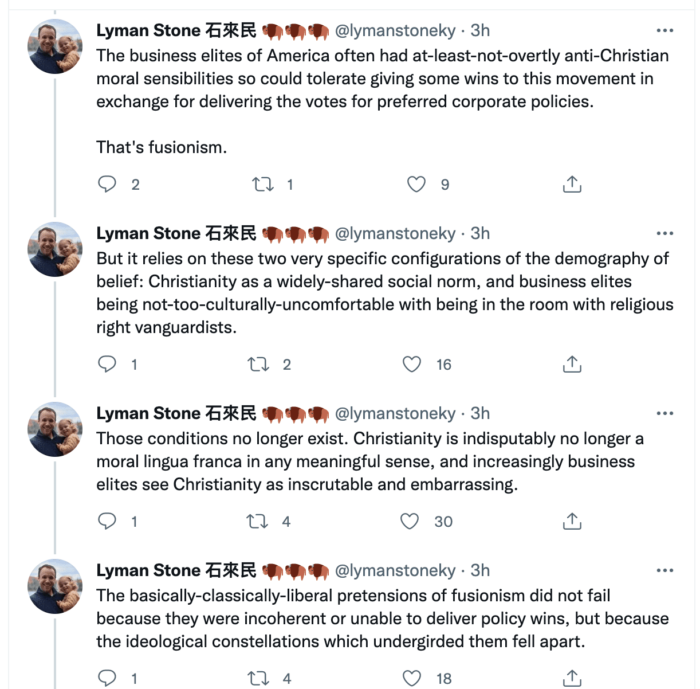
So, fusionism is dead because we are a post-Christian nation (nota bene, Stone is a Christian). So what’s next? Stone says the future of the Right seems to be playing out among Neo-Reactionaries and National Conservatives.
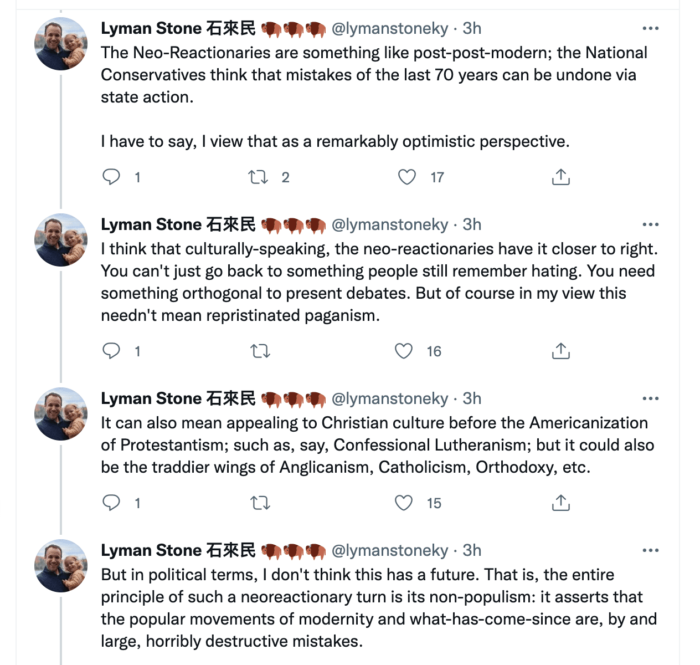
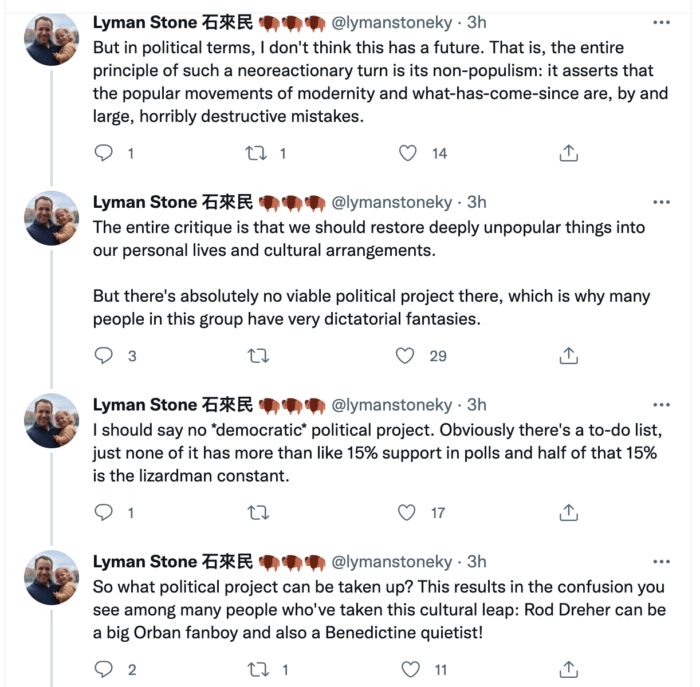
One more:
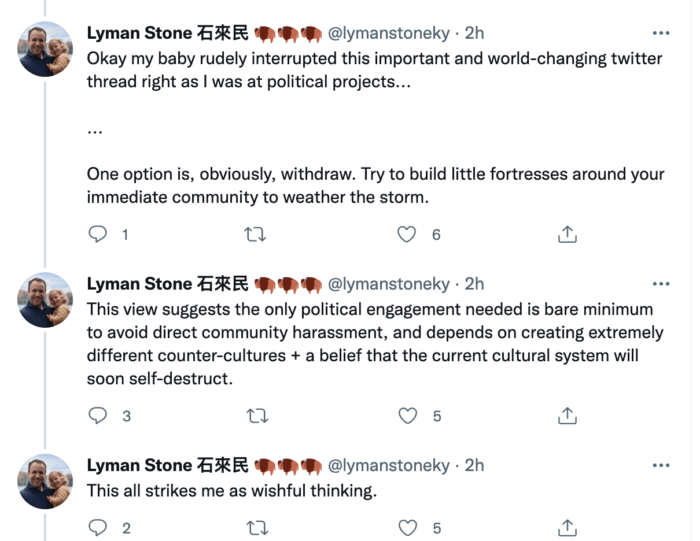
Read the whole thing. It’s a long, meaty thread, and I’ve only quoted part of it (mostly the part that involves me and my ideas).
I think Lyman doesn’t quite get my position — which is admittedly an unsatisfying position, but it’s the best I can do right now. I am not now, nor have ever been, a “Benedictine quietist”. In The Benedict Option, I make it clear that Christians have to stay engaged in politics, if only to protect religious liberty (though there are more reasons to stay involved than that). My main point is that politics are not a solution to what threatens us the most; that politics are at best a partial solution. We are not going to vote our way out of this, nor are we going to empower authoritarian politicians who can accomplish this for us.
As I see it, the great crisis of our time is not the erosion of democracy. It’s the dissolution of Christianity in the West. None other than Viktor Orban himself once spoke about the limits of politics in this matter: he said that as a politician, he can provide people with things, but he can’t provide them with meaning. You can’t order people to believe in Christ. You can try, but it doesn’t work. Well, it “worked” in the medieval period, when the masses did what the sovereign ordered them to do, and over generations, people came to truly believe in Christianity. But it is impossible to imagine that working today.
My personal project, as laid out in The Benedict Option and Live Not By Lies, is all about Christian faith withstanding the current and future era. There is no contradiction between being an Orban fanboy and also believing in the Benedict Option. Why? Because I don’t expect Orban or any other leader to be able to use politics to solve a religious and cultural problem; I only want politicians to protect the ability of churches and religious and cultural institutions to carry out our missions. In a pluralistic culture like America’s, to do much more than that would require something like tyranny, because as Lyman Stone recognizes, the kinds of policies that serious religious conservatives favor are losing popularity.
Contrary to what Stone suggests, I do not believe the system will “soon self-destruct”. I believe that it will eventually fall apart, but that could take a very long time, and it won’t do so without immense destruction. I could vote for any kind of conservative, and would probably be happier on balance in some sort of integralist order than the degraded liberalism we’re increasingly having to live with. But I also know that an integralist order would likely compel people to hate Christianity as a handmaiden to an unpopular state. It would likely make it easier to practice Christianity, but make it harder to win converts. I remind you of what I heard from some young Polish Catholics who support the Law & Justice government: that the government’s pushing hard on conservative Catholic principles, beyond the limits of where the Polish people are willing to go, is discrediting Christianity in the eyes of the younger generation.
Besides, Christianity is not declining in the West because of politics. It is declining for a variety of reasons, most of all because of material abundance, radical individualism, and the loss of a sense of sacred order. How are we going to legislate our way out of that hole? We need good laws, for sure, but more than that we need far more discipleship and far more evangelization. I would put discipleship ahead of evangelization, because you can’t give people what you don’t have. If evangelization means simply getting people to say the Sinner’s Prayer, and/or join a church, but leave their lives unreformed, then what is the point? Cultural Christianity is more important than most people think — Robert Louis Wilken explains why in this great 2004 First Things piece, which I cannot recommend often enough — but it’s important precisely because it makes it easier for people within such a culture to embrace the truth of Jesus Christ.
About building “little fortresses,” the Benedict Option is more about building little fortresses within oneself and one’s immediate community. I’m all for building external “fortresses,” but as the case of the Benda family of Prague shows, it is more important to build the unseen fortress within members of the community. It was all but impossible to build external fortresses capable of keeping the Communist government at bay, but Vaclav and Kamila Benda knew that they could build up the resistance within themselves and their children, and do their best to spread it to the community around them. The most important task they had was to keep the memory of what it meant to be Czech and Christian alive until such time as totalitarianism fell. They were all well aware that they were almost powerless in the face of totalitarianism, but they also knew about totalitarianism’s vulnerabilities. None of those dissidents expected Communism to collapse in their lifetimes. They built structures of resistance because it was the right thing to do.
People who think my work is about coming up with a new political configuration misunderstand it. If one is a neoreactionary or one is a National Conservative, or if one is Trumpist, or whatever one is, we still need the Benedict Option, defined as a way of life dedicated to fully living out traditional Christianity within one’s own sphere. Politics can only give us things; it can’t give us ultimate meaning. Only religion can do that. If you understand that the Benedict Option is primarily a religious and cultural project, and only secondarily a political project, you’ll be on target.
To be clear: I’m not really antipolitical; I believe that politics does have a role to play in Christian survival, and it’s probably accurate to say that I’m more aware of that now than when I published The Benedict Option in 2017. But conservative Christians have been dealt a very weak hand, and I see no reason to believe that we have the skill to play it intelligently. And I don’t know what “playing it intelligently” would mean in this fast-moving culture. Adrian Vermeule, the Carl Schmitt of the neointegralists, is counting on the culture changing rapidly at some point to favor integralism. This is magical thinking. He is right to point to how rapidly the culture changed to accept and affirm the insanity of, say, transgenderism, but what he ignores is that transgenderism is a logical fulfillment of what people in our society had already come to believe about the meaning of marriage, of sex, and of identity. I don’t see the prep work being done to swing the culture back to (checks notes) 19th century ultramontanist reaction. Maybe it is, and I’m just too sinful to see it.
Having said that, at this point, I will vote for whoever is more likely to protect the values, the liberties, and the institutions that mean the most to me, but I don’t expect deliverance from politics. If we conservative Christians were able to control politics completely, but the churches were empty, this would be defeat, straight up. The Benedict Option is not a strategy for political engagement; it is a strategy for the survival of Christianity under current conditions. It’s not fair to judge it for something it doesn’t try to be. I do, however, think that Stone is on the right track with his criticism of neoreaction as a political program. Their judgments on the failures of liberal democracy may be correct, but it is hard to see how they are going to persuade enough people to agree with them to make a difference. I think National Conservatism has a better shot, because it operates within the liberal democratic system, which almost everybody accepts. My heart is with the neoreactionary critique, but my head is hanging on by its cerebral fingertips to classical liberalism out of prudence. It’s the devil we know.
To conclude, I agree with Stone here:
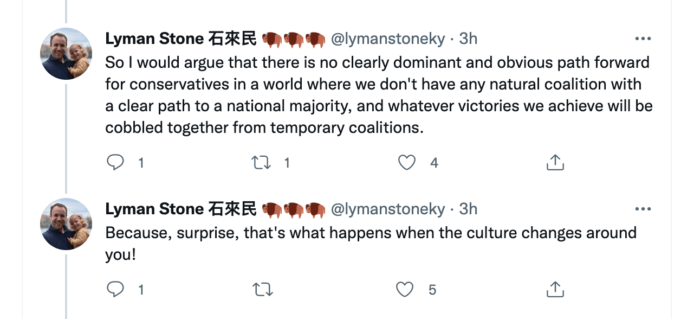
Thoughts? Do make a point of reading the entire Stone thread, which has a lot more in it than what I have quoted here.
Subscribe for as little as $5/mo to start commenting on Rod’s blog.